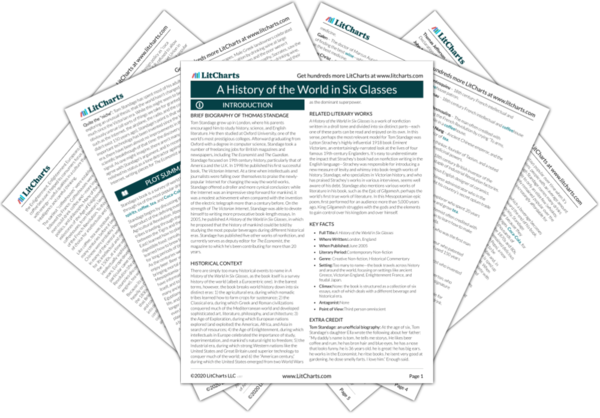It’s interesting to note that all six of the drinks Standage discusses in his book bring about some kind of mental or physical change in the drinker: drunkenness, alertness, calmness, etc. At various points in history, these six drinks have been feared for their ability to do exactly this. People have criticized alcohol for causing violence and unruliness for as long as people have been drinking it, and there were even those who believed that tea caused the same symptoms.
While many of the medical and moral complaints about drinks seem silly in retrospect, they point to the same important truth: drinking a beverage poses a challenge for one’s freedom and one’s self-control. In the act of drinking a drink—both because of the chemical effects of the drink and because of the cultural expectations that go along with drinking it—people might become more honest, more direct, or more alert to their own emotions. This is one of the reasons that people conduct business meetings or have frank discussions while drinking—the act of drinking is an act of contemplation and self-contemplation. The question then becomes: while drinking a beverage, should one let down all defenses and give into one’s instincts and emotions, or try to fight these urges through rigorous self-control?
One of the most common answers to this question, judging by Standage’s research, is that drinkers should use the occasion of drinking as an opportunity to build up one’s self-control and strengthen one’s mind. In the Greek symposium, for example, Socrates held that consuming large quantities of wine presented both a danger and an opportunity. The drunkard would be more likely to give in to his sexual urges, but if he could fight these urges until he sobered up, then he would be sure to go through life with more self-control and self-awareness. To drink a beverage and still be the same person was considered a high mark of maturity. One sees a similar philosophy in the machismo of drinking hard liquor: to be able to “hold your liquor” is the ultimate sign of maturity in many cultures.
And yet Standage ends his book by detailing the history of Coca-Cola, a beverage whose “culture,” according to Standage himself, is one of hedonism, unlimited freedom, and giving into desire. The supremacy of Coke in the modern world, he claims, reflects the supremacy of an idea: the idea that the best kind of life is one in which people do what they want to do, whenever they want to do it.
Standage isn’t judging the “culture” of Coke, wine, or coffee—he’s merely describing them. At the same time, he points out the major differences between the respective cultures of each of these beverages. In the case of wine, coffee, and arguably spirits, the goal at one point in time was to translate the physical satisfaction of drinking a drink into some intellectual or socially acceptable behavior: conversing, theorizing, debating, etc. Perhaps the supremacy of Coke in the world thus suggests a change in the way people think about freedom and self-control. Where once the highest ideal was controlling one’s instincts and biological urges, the model of “good” behavior now is to have a good time, savoring physical pleasures above all else.
Freedom and Self-Control ThemeTracker

Freedom and Self-Control Quotes in A History of the World in Six Glasses
Enkidu’s primitive nature is demonstrated by his lack of familiarity with bread and beer; but once he has consumed them, and then washed himself, he too becomes a human and is then ready to go to Uruk, the city ruled by Gilgamesh. The Mesopotamians regarded the consumption of bread and beer as one of the things that distinguished them from savages and made them fully human.
Plato saw drinking as a way to test oneself, by submitting to the passions aroused by drinking: anger, love, pride, ignorance, greed, and cowardice. He even laid down rules for the proper running of a symposion, which should ideally enable men to develop resistance to their irrational urges and triumph over their inner demons.
The diffusion of this new rationalism throughout Europe was mirrored by the spread of a new drink, coffee, that promoted sharpness and clarity of thought. It became the preferred drink of scientists, intellectuals, merchants, and clerks—today we would call them “information workers.”
















